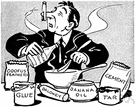fetor
(redirected from fetors)Also found in: Thesaurus, Medical.
fe·tor
(fē′tər, -tôr′) also foe·tor (fē′tər)n.
A strong, offensive odor. See Synonyms at stench.
[Middle English fetoure, from Latin fētor, from fētēre, to stink.]
American Heritage® Dictionary of the English Language, Fifth Edition. Copyright © 2016 by Houghton Mifflin Harcourt Publishing Company. Published by Houghton Mifflin Harcourt Publishing Company. All rights reserved.
fetor
(ˈfiːtə; -tɔː) orfoetor
n
an offensive stale or putrid odour; stench
[C15: from Latin, from fētēre to stink]
Collins English Dictionary – Complete and Unabridged, 12th Edition 2014 © HarperCollins Publishers 1991, 1994, 1998, 2000, 2003, 2006, 2007, 2009, 2011, 2014
fe•tor
(ˈfi tər)n.
an offensive smell; stench.
[1475–1500; (< Middle French) < Latin]
Random House Kernerman Webster's College Dictionary, © 2010 K Dictionaries Ltd. Copyright 2005, 1997, 1991 by Random House, Inc. All rights reserved.
ThesaurusAntonymsRelated WordsSynonymsLegend:
Switch to new thesaurus
| Noun | 1. |  fetor - a distinctive odor that is offensively unpleasant fetor - a distinctive odor that is offensively unpleasantodour, olfactory perception, olfactory sensation, smell, odor - the sensation that results when olfactory receptors in the nose are stimulated by particular chemicals in gaseous form; "she loved the smell of roses" |
Based on WordNet 3.0, Farlex clipart collection. © 2003-2012 Princeton University, Farlex Inc.
Translations
fe·tor
n. fetor, mal olor, hedor.
English-Spanish Medical Dictionary © Farlex 2012